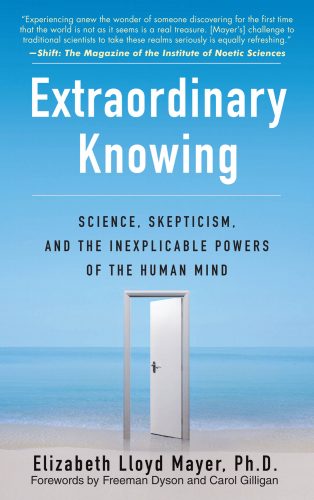Extraordinary Knowing
Science, Skepticism and the inexplicable power of the Human Mind
By Elizabeth Lloyd Mayer, PhD
Penguin Random House (February 26, 2008)
Have you ever had an experience you could not explain logically? That’s what happened to Elizabeth Lloyd Mayer, a psychoanalyst and researcher living an “ordinary” life.
The harp story
After months of searching for her daughter’s stolen harp, desperation — and a good friend – prompted Dr. Mayer to call on a dowser for help in locating this rare harp. She was completely taken off guard when in a couple of minutes, a dowser in Arkansas pinpointed exactly where to find her daughter’s stolen harp — in Oakland, California.
Shortly afterwards, the harp returned home. You can watch Dr. Mayer tell her harp story on YouTube in her own words. It changed her life and brought us Extraordinary Knowing.
Her difficulty in wrapping her mind around this illogical event resulted in a fourteen-year odyssey researching the paranormal. Mayer started her research with Sigmund Freud’s writings on telepathy and his correspondence with Sandor Ferenczi. She then moved on to study various psychic phenomena, CIA experiments on remote viewings, leading edge neuroscience, and quantum physics.
Extraordinary Knowing is Mayer’s answer to the question — can we “investigate apparently anomalous experiences while remaining firmly grounded in rational thought?” (page 8)
Dr. Mayer uses the Gestalt psychology notion of figure/ground perception to explain “extraordinary knowing.” I find this comparison quite useful. In Gestalt, one can only see the vase or the profile, but not both at the same time. Likewise, one can either be in an ordinary state of rational thought or in an altered state, just not at the same time.
An Illogical event
For years we have been taught “not to know what we know” for fear of being thought crazy. I certainly spent time in my early days of practice struggling with “knowing what I knew.” This fear of “craziness” can defy meticulous research just as we discovered in Dean Radin’s book Real Magic. If the research goes against a scientist’s belief system, the scientist refuses to believe it. He or she assumes the research is flawed. The senior scientist in the CIA’s remote viewing experiments, Harold E. Puthoff, admits that he had to change his belief system in order to overcome his skepticism. Proof was not enough.
Extraordinary is the number of people, scientists, psychoanalysts, and lay people who came forward to tell their stories. Like Dr. Mayer and finding her daughter’s harp, their experiences were real.
Extraordinary Knowing
Dr. Mayer’s book gives us a way to research “extraordinary knowing.” We can overcome the biases science has placed on us. Dr. Mayer has also given us permission to know about “spooky” happenings. We can now look at these phenomena – phenomena that even Einstein did not want to research — and not feel crazy.
Unfortunately, Dr. Elizabeth Lloyd Mayer died before her book was published in 2007.
I continue to find this book enlightening and recommend it to friends and clients wanting to explore the unexplainable.
Take care of yourself and have a wonderful week.
Ellen
